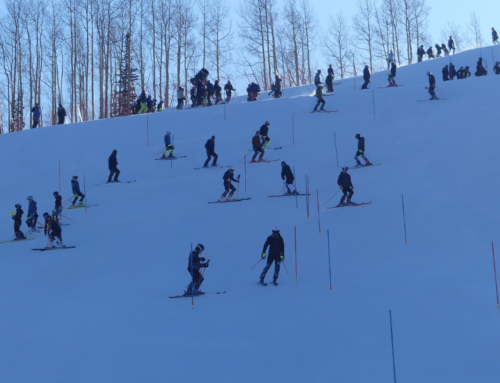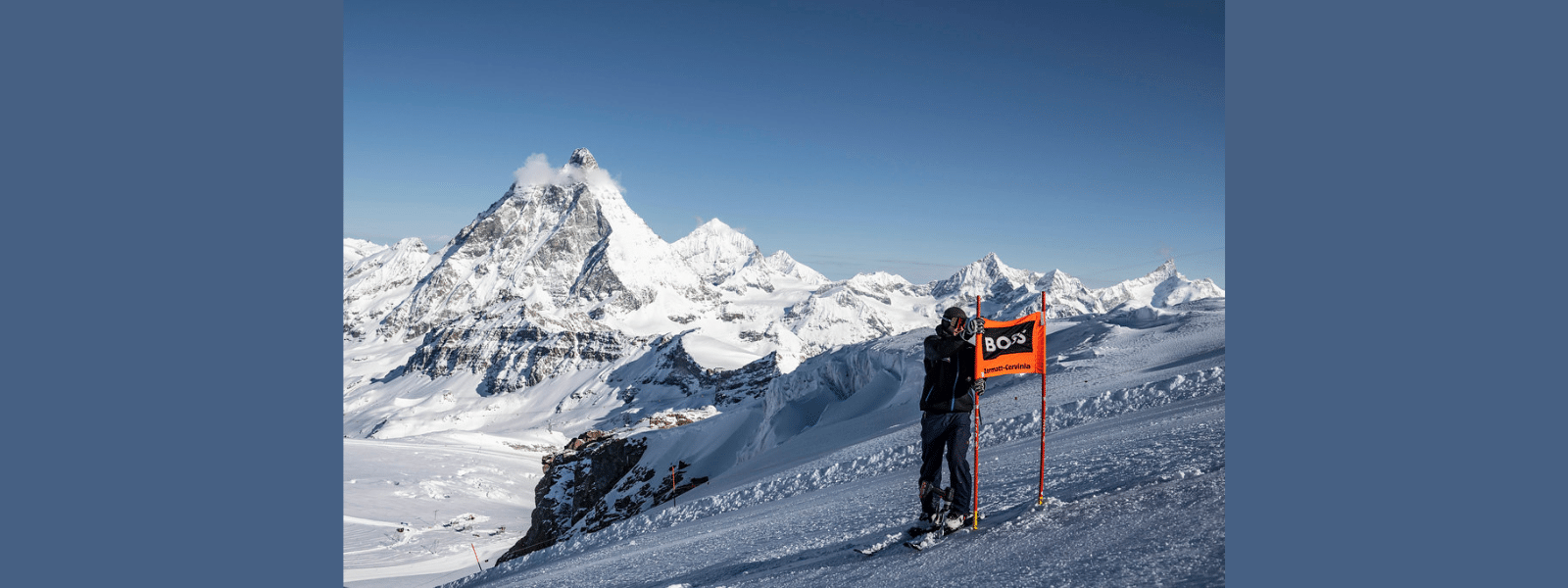New lawsuit targets VANOC in jumping fight
 The athletes named as plaintiffs in the lawsuit filed in the British Columbia Supreme Court spoke out Thursday at a press conference in the hopes of ensuring that women ski jumpers have the same Olympic opportunities as male ski jumpers.
The athletes named as plaintiffs in the lawsuit filed in the British Columbia Supreme Court spoke out Thursday at a press conference in the hopes of ensuring that women ski jumpers have the same Olympic opportunities as male ski jumpers.
“I’m here because I’ve dedicated my life to ski jumping,” said U.S. Ski Team jumper Lindsey Van at the press conference. “I want to make this right for future girls of the sport. This is not right any more. It has to change. I don’t want to have to tell girls coming up that I will be coaching that, ‘There really is no future for you.’”
On Wednesday, a lawsuit was filed against the Vancouver Olympic Organizing Committee for discriminating against women’s ski jumpers under the Canadian Charter of Rights and Freedoms. The women are asking the court for an injunction requiring VANOC to include women's ski jumping in the Games, or, alternatively, to exclude men's ski jumping if it decides to also exclude women.
 VANCOUVER, B.C. — The athletes named as plaintiffs in the lawsuit filed in the British Columbia Supreme Court spoke out Thursday at a press conference in the hopes of ensuring that women ski jumpers have the same Olympic opportunities as male ski jumpers.
VANCOUVER, B.C. — The athletes named as plaintiffs in the lawsuit filed in the British Columbia Supreme Court spoke out Thursday at a press conference in the hopes of ensuring that women ski jumpers have the same Olympic opportunities as male ski jumpers.
“I’m here because I’ve dedicated my life to ski jumping,” said U.S. Ski Team jumper Lindsey Van at the press conference. “I want to make this right for future girls of the sport. This is not right any more. It has to change. I don’t want to have to tell girls coming up that I will be coaching that, ‘There really is no future for you.’”
On Wednesday, a lawsuit was filed against the Vancouver Olympic Organizing Committee for discriminating against women’s ski jumpers under the Canadian Charter of Rights and Freedoms. The women are asking the court for an injunction requiring VANOC to include women's ski jumping in the Games, or, alternatively, to exclude men's ski jumping if it decides to also exclude women.
Ski jumping will be the only sport in the 2010 Olympic Winter Games that will not include competition for the opposite gender. As a result of the IOC decision, Canadian ski jumpers filed a complaint with the Canadian Human Rights Commission a year ago, but a settlement was reached promising the Canadian government would attempt to lobby the IOC to include the sport. They Canadian Olympic Committee has formally requested that the IOC reconsider.
Clark, Q.C., a partner at Davis LLP, is spearheading the more proactive approach with this lawsuit. He is offering his services pro bono for the plaintiffs in the case that include U.S. jumpers Van and Jessica Jerome, and a number of other top-10 internationally ranked female ski jumpers in the world, including athletes from Norway, Germany, Austria and Slovenia. Marie-Pierre Morin, a retired Canadian ski jumping national champion and Karla Keck, a retired American national champion are plaintiffs as well.
Clark will argue that VANOC is carrying out the policies of all Canadian law from federal to municipal. “In doing so,” he said, “they are subject to the Canadian Charter of Rights and Freedoms and as we all know it sets up the fundamental values that Canadians hold dearest. One of the things in the charter is gender equity, and we say because VANOC is carrying out government policy, because of that, it is bound by the rights and freedoms.”
“They are the ones who are organizing it,” said Clark, about why targeting VANOC. “They are the ones responsible for the facilities. They are the ones responsible for the events and they are running the Games. … Therefore we are going to put forward the argument that you [VANOC] have to — it’s a matter of Canadian law — that you have gender equity in this sport.”
At the press conference, the athletes, one by one, told their stories about training six days a week, living on shoestring budgets with their parents in order to afford competing in a sport that offers little in sponsorship dollars or prize purses — all in order to someday compete at the Olympics. Women’s Ski Jumping-USA President Deedee Corradini explained that this decision is hurting the future of the sport. Jumpers are quitting because the highest international level for women, Continental Cup, is still one step below men’s World Cup level and they can't aspire to the Olympic Games. The IOC has refused to allow women to compete in 2010 pointing to a number of factors that the plaintiffs in this case say can be easily refuted (see subhead below).
“How long do we have to wait?” Corradini asked. “We’re losing an entire generation of ski jumpers.”
Van, 23, and Jerome, 21, said that they are plaintiffs on principle. They may not be able to compete in 2010 and likely too old in 2014, but they can speak out on behalf of the jumpers to come. “Over the years, I have seen many talented young women quit because there is no higher level [of competition],” Jerome said. “I want to see the girls younger than me in the next generation not struggle with this and see them have an opportunity.”
Jerome said internationally women have struggled to prove their ability when “they take us to the worst ski jumps in the world. They take us to facilities that shouldn’t even be jumped by men or women. They make us jump in the worst conditions possibly imagined. By putting us in those types of situations, they are trying to make a point that we can’t handle it but then again it’s a double standard because they don’t make the men do that.”
 Jerome previously told SR that an example of the bias was at the world-famous Holmenkollen in Norway, where in 2005 the women were forced to compete in terrible weather conditions and, consequently, didn’t jump that far. Women’s competitions are no longer held there.
Jerome previously told SR that an example of the bias was at the world-famous Holmenkollen in Norway, where in 2005 the women were forced to compete in terrible weather conditions and, consequently, didn’t jump that far. Women’s competitions are no longer held there.
The plaintiffs also argued that they grew up competing against men and should be treated the same, especially since they continue to prove their skills on the world stage. Something needs to change, they say.
“I competed alongside the men until 2002,” said Karla Keck, a retired U.S. national champion. “Many of the boys I grew up jumping with have gone on to compete at the Olympics. When I was 14 in 2002, I competed in a men’s Continental Cup … in order to be able to compete on the men’s World Cup circuit or to go to the Olympics you have to have points in men’s Continental Cup events. Currently, today I’m the only woman to have scored a men’s Continental Cup point. After that competition, women were banned from ever competing in men’s competitions again and we were given our own circuit to compete in. So essentially, there was no way we could ever go to the Olympic Games or compete at the World Cup level.”
Jerome recently proved, again, that women are pushing the sport for both genders.
“I had the opportunity to jump here in Whistler in January right when the jump opened,” Jerome said. “It’s a great facility. It’s one of the best ski jumps I’ve ever jumped in the wo
rld and I was able to set the hill record on the K-90 meter at 105 and a half meters. I think that says a lot for our sport considering there are males and females [jumping] there. It says a lot that a woman can set the hill record. I think that was a good time and place to show our skill level and our readiness for the Olympics.”
IOC’s original decision causes the backlash
The women jumpers of the world have followed the process to have an event added in the Olympic Games for over a decade now, the plaintiffs argue.
"We have had two demonstration events for the World Championships," they pointed out in an SR letter to the editor. "The first was held in Thunder Bay, Ontario in 1995, and the second was held in Ramsau, Austria in 1999. Since '99, we have applied for World Championship events with an unsuccessful vote in the FIS Ski Jumping Committee in 2004. At the 2006 FIS Congress we were approved by a 114-1 vote for the 2009 World Championship and FIS recommendation to the IOC for inclusion on the 2010 Olympic program. We also have had two demonstration events at the World Junior Championships. The first was held in St. Moritz, Switzerland in 1998, and the second was held in Stryn, Norway in 2003. The FIS established the elite women’s circuit in 2005 with the first Continental Cup competitions. Since then there have been three World Junior Championships held, and next year, Women's jumping will have a full medal event at the World Championships in Liberec, Czech Republic. She pointed out that the women have met criteria stablished by the IOC to become an Olympic sport. At the IOC meeting in Guatemala in 2007, the Olympic Charter was changed to no longer require that two World Championships are held as a prerequisite to gain Olympic inclusion. Also, in 1991, the IOC changed the rules to require any new sports that are added to the Games must have both men’s and women’s competitions. Women’s ski jumping was grandfathered out and excluded from that requirement, despite ski jumping being one of the six original events when the Olympic Winter Games were started in 1924."
Corradini said ski jumping clearly has universal appeal. Just look at the stats, she said. Compared to other sports that have been included since 1991, ski jumping shows the strongest global participation numbers of all. According to her statistics, women’s ski jumping in 2006-07 had 83 women from 14 nations. In comparison, snowboardcross had 34 women from 10 nations; ski cross 30 women, 11 nations; bobsled 26 women, 13 nations; skeleton 39 women, 12 nations; and luge 45 women, 17 nations (the only sport with more countries participating).
“When [IOC] admitted skicross, that was the same time they told us no,” Corradini said. “If you look at the numbers of women only on one continent that had been competing at that time in 2006, we are so far ahead of where skicross is. And the bottom line is, why did they want skicross? Because it’s an exciting new sport and they wanted it for the men but they were forced to include the women even though the women are way behind where we are in ski jumping. So the unfairness of the situation is just ridiculous.”
VANOC frustrated by women’s ski jumping efforts
Earlier on Thursday, VANOC head John Furlong told reporters that he was frustrated that VANOC is the target, according to Canada’s Globe and Mail. "What's frustrating is that this is not in our jurisdiction at all," Furlong told the newspaper. "It's really a matter for the sport to work out with the IOC. The sport knew the process, it participated, and it wasn't successful."
VANOC will be given 30 days to reply to the writ — which includes arguments that have not been proven in court — before the matter proceeds to trial.
Clark expects that a hearing will take place sometime in the fall, and a decision made shortly after that.
To prove universal support, the women’s ski jumping community posted a petition on www.wsj2010.com that they hope will garner at least 100,000 signatures from supporters across the globe.





















